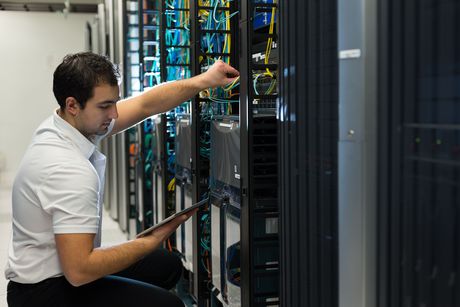Things that matter: digitalisation is the key to shaping the future

The world is going through a transformation driven by globalisation and digitalisation, which makes me very optimistic for Australia’s future — as long as our leaders embrace the transformation. Traditional manufacturing and process industries are being redefined and the traditional boundaries are blurring. Digitalisation overlaps into all parts of the economy and transforms the way we do business. And every change, including the recent change of Prime Minister, brings with it new opportunities to create positive energy and to position Australia for a stronger and more confident future. At the end of the day we are inspired by the desire to shape the future, but we must be grounded in reality.
Some of the basic tenets that society operates on are having efficient and competitive energy, industry and infrastructure. These are the things that matter to business, society and the world at large. At Siemens we focus on the impact of digitalisation across three areas. First is the future of manufacturing and industry, where we see automation and digitalisation merging and leading to a fourth industrial revolution. Second, we see the emergence of what we call ‘intelligent infrastructure’ where digitalisation is applied to bring numerous efficiencies and open opportunities that haven’t even yet been considered. Third, we see digitalisation being used to ‘create sustainable energy’ — providing data that can optimise ongoing performance.
But if digitalisation is so important, where does it sit in the business and political agenda? Who needs to drive it?
Clearly, this has to start at the top. Digitalisation transforms the entire business and the entire economy. The immense scope of change it brings — and the level of investment required — means that it belongs on the CEO’s agenda and even on the agendas of the Prime Minister and state Premiers. It encompasses digitising both horizontal and vertical value chains and it completely changes product and service offerings, and it brings productivity gains for our infrastructure such as rail and roads, city buildings and energy.
Digitalisation also requires substantial investment. From now until 2020, German industry is expected to invest €40 billion annually in digitalisation applications. Industrial firms surveyed say they will invest, on average, 3.3% of their revenues on Industry 4.0 solutions over the next five years. This corresponds to nearly 50% of all planned capital investments. It is also why the Australian–German bilateral relationship is so important, and I’m really pleased to be a member of the Australian Government’s advisory council on this relationship. For instance, Germany leads the world in advanced manufacturing productivity; therefore, knowledge transfer and joint major projects would greatly benefit Australia.
The last thing to remember is that this is not a purely academic theory — it must be grounded in reality if we are to shape the future. It’s really happening and it’s based on technology available today combined with process and engineering know-how. Within five years in Germany, over 80% of companies will have digitalised their value chains. German companies expect that by 2020, 86% of horizontal and 80% of vertical value chains will achieve a high level of digitalisation and will thereby be closely interconnected.
With this in mind, now more than ever positive human energy needs to transform into positive actions. This in turn creates confidence, which in turn creates growth, which in turn becomes a continuous cycle. And digitalisation gives us something to be very positive about.
AI and data science will lead the next Industrial Revolution
Are we there already? Or is AI just another buzzword that will soon pass?
AMW2024 comes to Darling Harbour
AMW2024 is on at ICC Sydney, in Darling Harbour, 17–19 April 2024.
Tiny sensor sniffs out toxic ammonia gas
Exposure to high levels of ammonia can lead to chronic lung conditions and irreversible organ...














